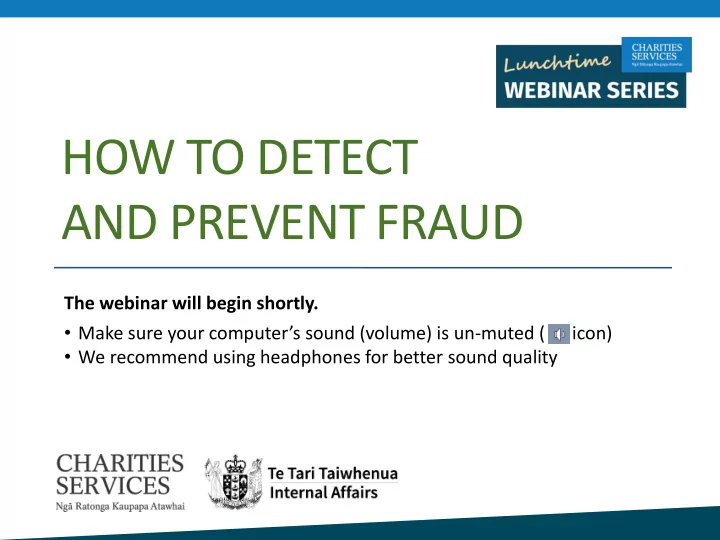

HOW TO DETECT AND PREVENT FRAUD The webinar will begin shortly. • Make sure your computer’s sound (volume) is un -muted ( icon) • We recommend using headphones for better sound quality
INTRODUCTION NAU MAI HAERE MAI Francesca Ephraim and Paul Budd will present the webinar on “How to detect and prevent fraud” today. Francesca is a regional advisor in the Capability team and Paul is a senior investigator in the Investigations team. Our teams work together to help charities manage their obligations.
LOGISTICS CAN YOU HEAR US? • Make sure your computer’s sound is un -muted. Ignore the icon. • Echoing or distortion? Try using headphones. • Sound cutting out intermittently? Check your internet connection and wait and see if it comes back. • The webinar is being recorded; you will receive a link to the recording tomorrow. • Listen-only webinar. Click icon to type questions. If your question doesn’t get answered during the webinar, email us at info@charities.govt.nz. • Download the handout (click on icon on right panel of screen).
WEBINAR OVERVIEW 1. What is fraud and why does it matter 2. What is fraud and how to detect it 3. What should you do when you do detect fraud 4. Charities Services approach to fraud 5. A case study 6. Questions
WHY ARE WE TALKING ABOUT FRAUD CHARITABLE SECTOR • Annual income of $18 billion • Assets total $58 billion • 27,000 plus registered charities • Run by volunteers
THE FINANCIAL ACTION TASK FORCE • New Zealand is a member of the Financial Action Task Force known as “FATF” • FATF set standards and promote measures to combat: ₋ Money laundering ₋ Terrorist financing and ₋ Other threats to the international financial system
WHY CHARITIES MIGHT BE VULNERABLE • High level of public trust and confidence • Charity sector culture • Lack of segregation of duties • Irregular cash flow • Poor governance • Lack of controls • Working overseas
DOES FRAUD ACTUALLY OCCUR? HEADLINES ... • “Teen arrested over charity fraud” • “Former senior members of charity face fraud charges” • “Couple, homeless man charged in charity scam” • “'Greedy': Christchurch couple ripped off disabled charity for spending spree” • “SFO condemns ‘deliberate acts of fraud’” • “Invoice fraud: How to avoid email scams”
WHAT IS FRAUD? FRAUD IS A FORM OF DISHONESTY AND CAN INCLUDE PEOPLE … • Stealing donations • Diverting charitable funds • Manipulating documents • Personal use of charitable resources • Misusing grants • Evading tax • Diverting charity funds to a personal business
WHO COMMITS FRAUD? • Anyone can be capable of being fraudulent • Internal fraud – staff member, officer or a volunteer • External fraud – contractor, donor or supplier • People in positions of trust
WHAT TYPES OF FRAUD ARE THERE? • Internal fraud – From someone inside your charity • External fraud – From someone outside of your charity
INTERNAL FRAUD • Stealing goods or money • Stealing cash donations, especially common with street collections • Using charity accounts for personal use • Claiming non existent or excessive expenses • Creating false or inflated invoices for goods/services • Submitting false applications for grants or misusing grant money • Creating non-existent employees or beneficiaries to direct payments to
EXTERNAL FRAUD • False invoicing • Unauthorised fundraising • Credit card scams • Identity fraud
WHAT ARE YOUR RESPONSIBILITIES? • Act in the best interests of your charity • Avoid conflicts of interests arising • Act with reasonable care and due diligence
WHAT ARE YOUR RESPONSIBILITIES? • Ensure everyone is aware of the risk of fraud • Use proper financial controls and procedures • Act responsibly and in the interests of the charity if fraud is discovered
PREVENTION IS BETTER THAN CURE • Do you have effective protection against fraud? YOU NEED TO THINK ABOUT … • Effective financial controls in place • Good systems and record keeping • Conflict of interests policy and register • A fraud policy (especially for bigger charities) • A disclosure policy • Discussing fraud and risk prevention, regularly
PREVENTING CYBER FRAUD • Use anti virus software • Use strong passwords • Keep your software updated • Protect yourself against identity theft • Verify transactions
HOW TO DETECT FRAUD IN YOUR CHARITY? • Unusual or suspicious expenses • Emails or letters from organisations you make large payments to saying they have changed account numbers • New suppliers in your accounting system • Unusual behaviour from staff/volunteers or the board • Irregular transactions
REPORTING FRAUD • If you suspect a crime – report to the Police • If it relates to your finances – report it to your bank • Let Charities Services know – email compliance@dia.govt.nz
CHARITIES SERVICES APPROACH TO FRAUD OUR KEY AREAS OF REGULATORY INTEREST ARE TO … • Protect the charity’s funds and assets • Protect trust and confidence in the charitable sector • Ensure the governing group comply with legal duties and obligations
CASE STUDIES • Food bank example • Educational charity example • The Panama Papers
RESOURCES • Read our resource – Top 10 tips • Resources for governance – Governance 101 (Sport NZ) • Resources for Fraud Prevention – Proactive Fraud Prevention Toolkit (BDO) • Not-for-profit Fraud Survey (BDO) • Financial policies – Example financial policies including fraud (Sport NZ) • Fraud policy guidance (Ministry of Justice) • Control mechanisms – Internal Financial Controls • Tackling charity fraud – Eight guiding principles (ACNC) • Protect your charity from fraud (ACNC) • Tackling charity fraud – Prevention is better than cure (UK Charity Commission) • Compliance Toolkit – Chapter 3: Fraud and financial harm • Tackling fraud in the charity sector • Charity Fraud Awareness Hub • Making a complaint to Charities Services
QUESTIONS • Please type your questions in now, if you haven’t already • If we don’t get to your question today please email it to info@charities.govt.nz
THANK YOU
Recommend
More recommend